人教版高中英语必修四 unit4 body language language points 课件 (共57张PPT)
文档属性
| 名称 | 人教版高中英语必修四 unit4 body language language points 课件 (共57张PPT) |  | |
| 格式 | ppt | ||
| 文件大小 | 1.4MB | ||
| 资源类型 | 教案 | ||
| 版本资源 | 人教版(新课程标准) | ||
| 科目 | 英语 | ||
| 更新时间 | 2020-11-15 17:50:07 | ||
图片预览

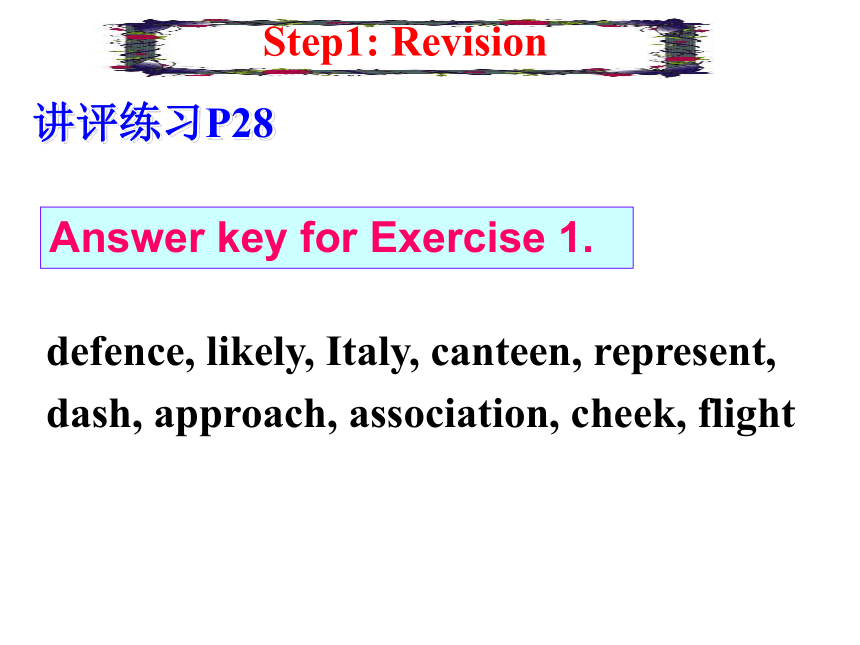
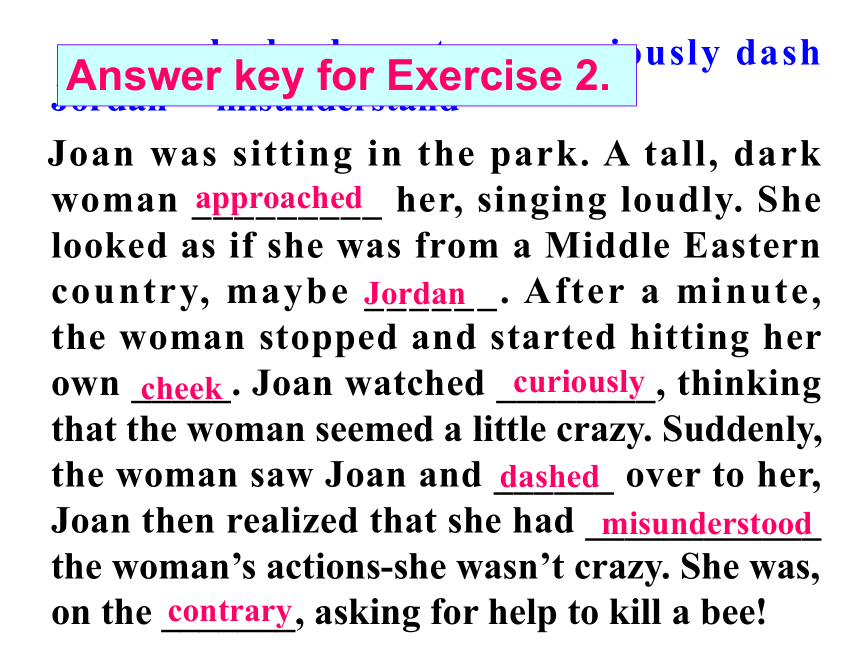
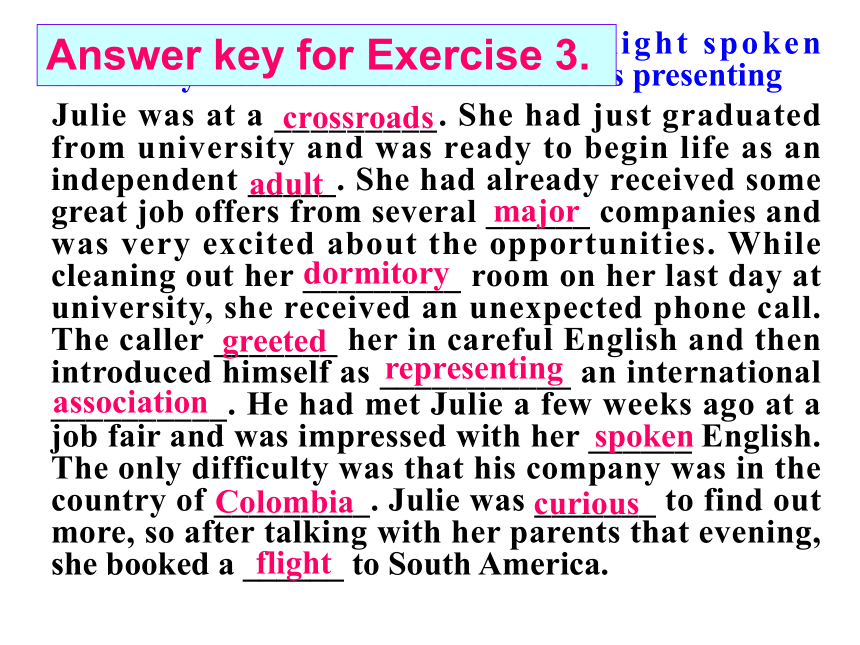
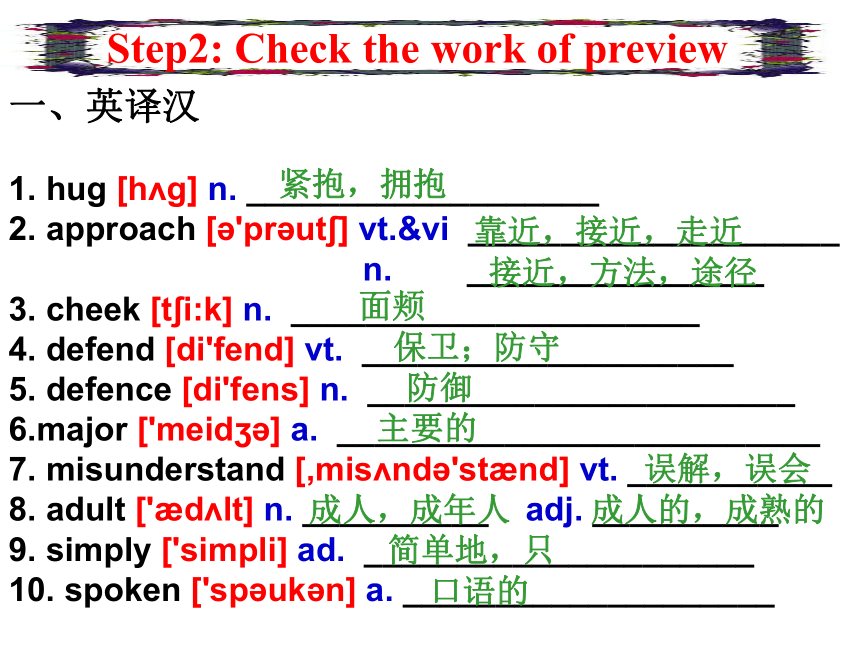

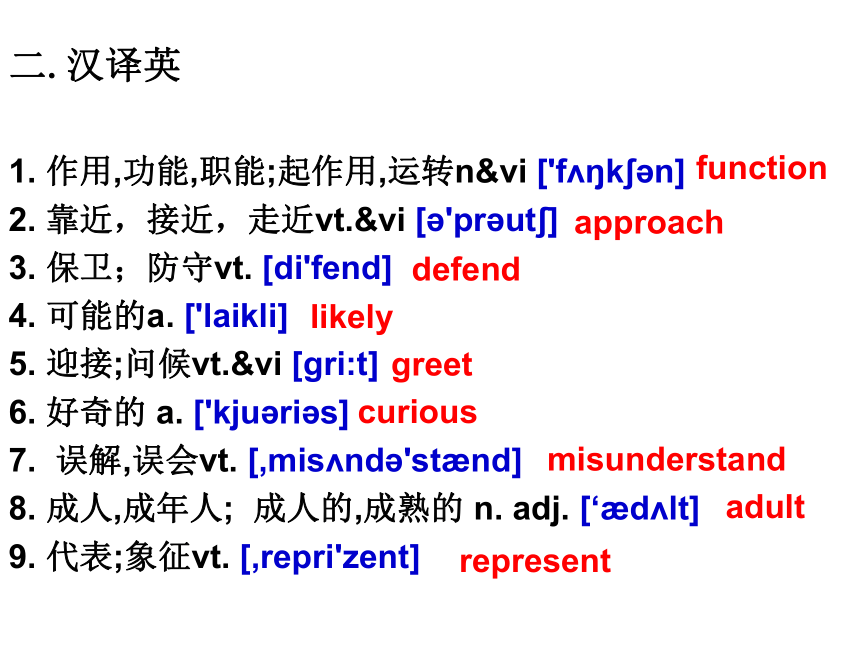
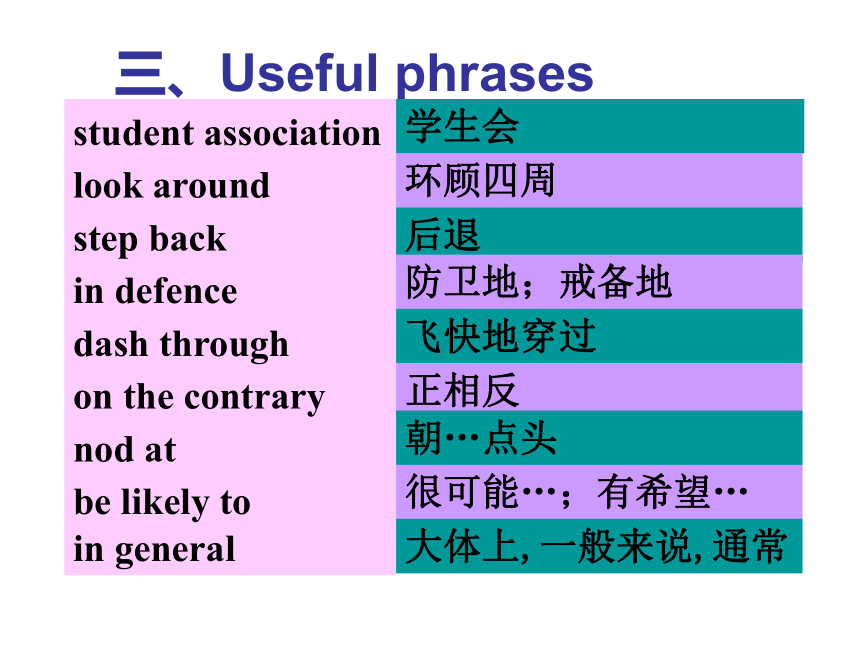
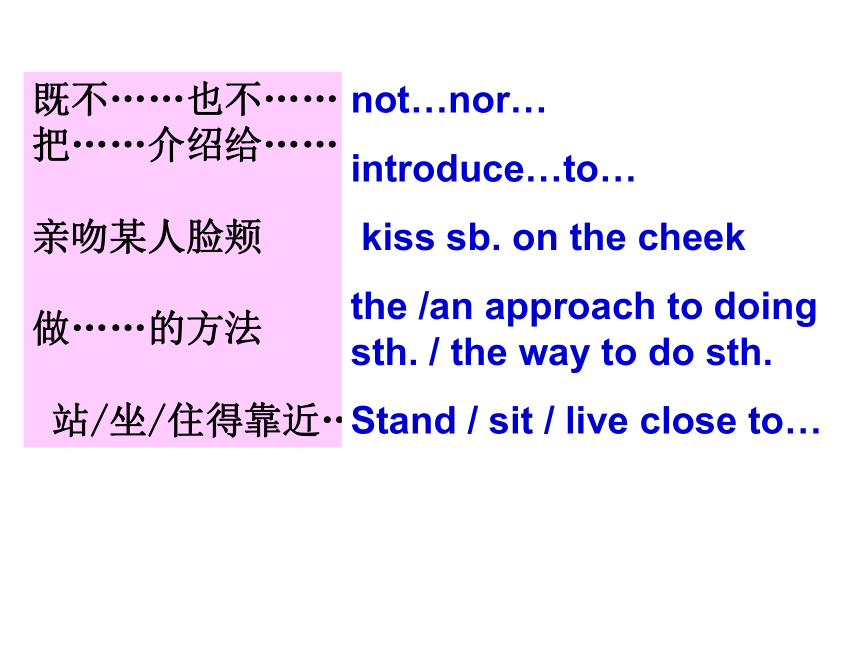
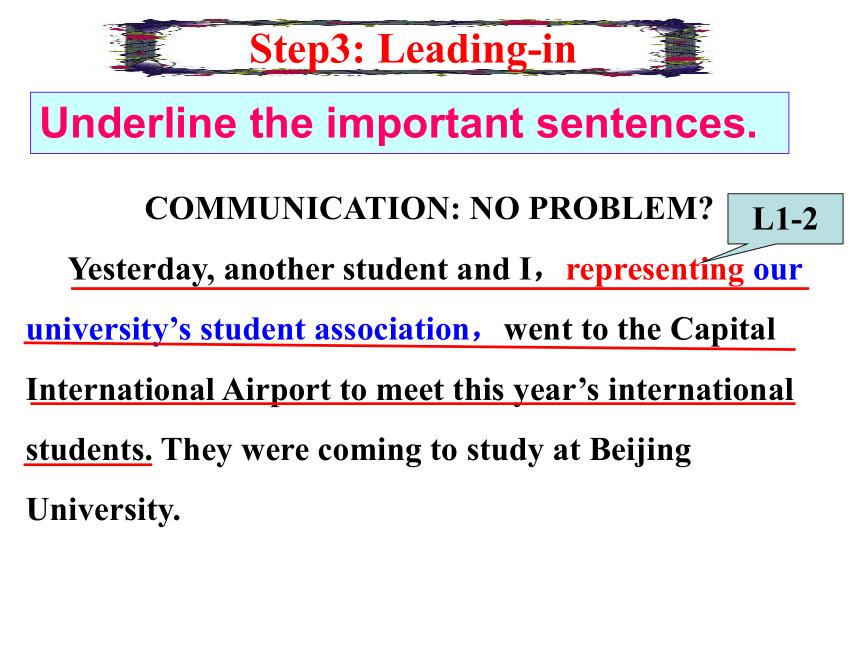

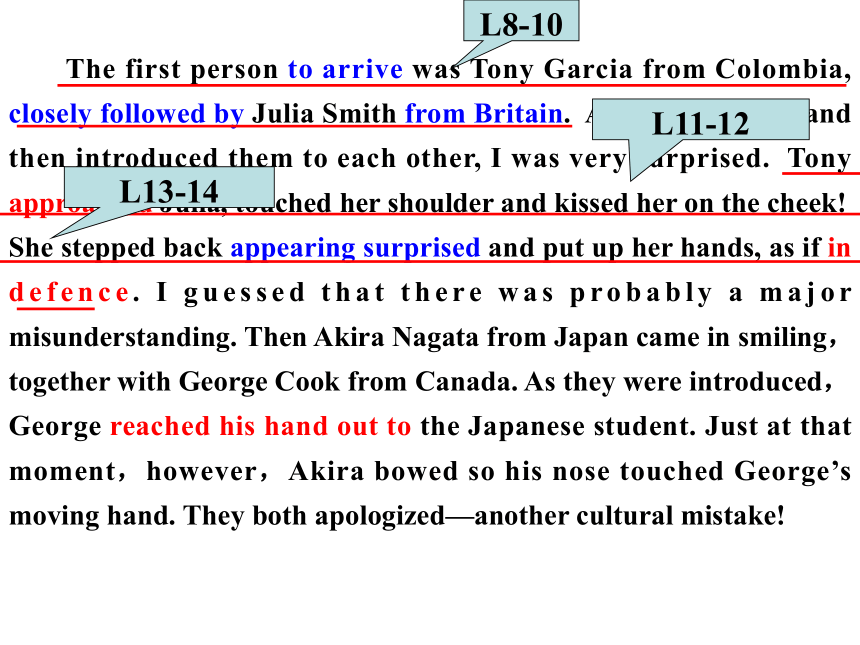
文档简介
M4U4 Body Language
approach cheek contrary curiously dash Jordan misunderstand
Joan?was?sitting?in?the?park. A tall, dark woman _________ her, singing loudly. She looked as if she?was?from a Middle Eastern country, maybe ______. After a minute, the?woman stopped and started hitting her own _____. Joan?watched ________, thinking that?the?woman seemed a little crazy. Suddenly, the?woman saw?Joan?and ______ over to her, Joan?then realized that she had ____________ the?woman’s actions-she wasn’t crazy. She?was, on?the?_______, asking for help to kill a bee!
adult crossroad major greeted flight spoken dormitory association Colombia curious presenting
Julie was at a _________. She had just graduated from university and was ready to begin life as an independent _____. She had already received some great job offers from several ______ companies and was very excited about the opportunities. While cleaning out her _________ room on her last day at university, she received an unexpected phone call. The caller _______ her in careful English and then introduced himself as ___________ an international __________. He had met Julie a few weeks ago at a job fair and was impressed with her ______ English. The only difficulty was that his company was in the country of _________. Julie was _______ to find out more, so after talking with her parents that evening, she booked a ______ to South America.
一、英译汉
1. hug [h?ɡ]?n. ___________________
2. approach [?'pr?ut?]?vt.&vi ____________________
n. ________________
3. cheek [t?i:k]?n. ______________________
4. defend [di'fend]?vt. ____________________
5. defence [di'fens]?n. _______________________
6.major ['meid??]?a. __________________________
7. misunderstand [,mis?nd?'st?nd]?vt. ___________
8. adult ['?d?lt]?n. __________ adj. __________
9. simply ['simpli]?ad. _____________________
10. spoken ['sp?uk?n]?a. ____________________
11. posture ['p?st??]?n.____________________
12. likely ['laikli]?a. __________________
13. greet [gri:t]?vt.&vi __________________
14. represent [,repri'zent]?vt. _______________
15. association [?,s?usi'ei??n]?n. ____________
16. dormitory ['d?:mitri]?n. _________________
17.canteen [k?n'ti:n]?n. ___________________
18. flight [flait]?n. __________________
19. curious ['kju?ri?s]?a. _________________
二.汉译英
1. 作用,功能,职能;起作用,运转n&vi ['f??k??n]
2. 靠近,接近,走近vt.&vi [?'pr?ut?]?
3. 保卫;防守vt. [di'fend]
4. 可能的a. ['laikli]
5. 迎接;问候vt.&vi [gri:t]?
6. 好奇的 a. ['kju?ri?s]?
7. ?误解,误会vt. [,mis?nd?'st?nd]
8. 成人,成年人; 成人的,成熟的 n. adj. [‘?d?lt]?
9. 代表;象征vt. [,repri'zent]?
1. Yesterday,another student and I,representing our university’s student association,went to the Capital International Airport to meet this year’s international students.
昨天,我和另一个同学代表我们大学的学生会去首都国际机场迎接今年的留学生。
【观察represent的用法并思考】
(1)Mr.Wang was chosen to represent our school at the meeting.
=Mr. Wang was chosen to be the representative of our school at the meeting.
王老师被选出代表我们学校去参加会议。
(2)This painting represents a hunting scene.
这张油画展现了打猎的情景。
(3)The dove represents peace.
=The dove is the representation of the peace.
(4) He represents himself as an expert.
(5) They represented their concerns to authorities.
他们向当局陈述了他们关心的问题。
2. Tony approached Julia,touched her shoulder and kissed her on the cheek! She stepped back appearing surprised and put up her hands,as if in defence.
托尼走近朱莉娅,摸了摸她的肩,并亲了她的脸!朱莉娅看上去很吃惊,往后退了退,并抬起双手,像是防卫。
【观察approach的用法并思考】
1. The time for graduation is approaching.
2.We approached the school.
3.We heard the approach of the train.
4.The approach to the house was blocked by snow.
通往那所房子的路已经被大雪阻塞了。
5. They discussed three different approaches to the study .
他们讨论了3种不同的学习方法。
【自我探究】
approach vt.& vi.走近;接近;靠近
n.[U] 接近
[C]方法;途径;通路。an approach to (doing) sth.
WELCOME
Answer key for Exercise 1.
defence, likely, Italy, canteen, represent,
dash, approach, association, cheek, flight
讲评练习P28
Step1: Revision
approached
Jordan
cheek
curiously
misunderstood
dashed
contrary
Answer key for Exercise 2.
crossroads
adult
major
dormitory
greeted
association
representing
spoken
Colombia
curious
flight
Answer key for Exercise 3.
紧抱,拥抱
靠近,接近,走近
面颊
保卫;防守
防御
主要的
误解,误会
成人,成年人
成人的,成熟的
简单地,只
口语的
接近,方法,途径
Step2: Check the work of preview
迎接;问候
代表;象征
社团,联系,联想
宿舍
航班;飞行
好奇的
食堂
可能的
姿势;体态
function
approach
defend
likely
greet
curious
misunderstand
adult
represent
三、Useful phrases
student association
look around
step back
in defence
dash through
on the contrary
nod at
be likely to
in general
学生会
环顾四周
后退
防卫地;戒备地
飞快地穿过
正相反
朝…点头
很可能…;有希望…
大体上,一般来说,通常
既不……也不……
把……介绍给……
亲吻某人脸颊
做……的方法
站/坐/住得靠近…
not…nor…
introduce…to…
kiss sb. on the cheek
the /an approach to doing sth. / the way to do sth.
Stand / sit / live close to…
COMMUNICATION: NO PROBLEM?
Yesterday, another student and I,representing our university’s student association,went to the Capital International Airport to meet this year’s international students. They were coming to study at Beijing University.
Step3: Leading-in
Underline the important sentences.
L1-2
We would take them first to their dormitories and then to the student canteen. After half an hour of waiting for their flight to arrive, I saw several young people enter the waiting area looking around curiously. I stood for a minute watching them and then went to greet them.
L5-6
The first person to arrive was Tony Garcia from Colombia, closely followed by Julia Smith from Britain. After I met them and then introduced them to each other, I was very surprised. Tony approached Julia, touched her shoulder and kissed her on the cheek! She stepped back appearing surprised and put up her hands, as if in defence. I guessed that there was probably a major misunderstanding. Then Akira Nagata from Japan came in smiling,together with George Cook from Canada. As they were introduced,George reached his hand out to the Japanese student. Just at that moment,however,Akira bowed so his nose touched George’s moving hand. They both apologized—another cultural mistake!
L8-10
L13-14
L11-12
Ahmed Aziz,another international student,was from Jordan. When we met yesterday,he moved very close to me as I introduced myself. I moved back a bit,but he came closer to ask a question and then shook my hand. When Darlene Coulon from France came dashing through the door,she recognized Tony Garcia’s smiling face. They shook hands and then kissed each other twice on each cheek,since that is the French custom when adults meet people they know. Ahmed Aziz,on the contrary,simply nodded at the girls. Men from Middle Eastern and other Muslim countries will often stand quite close to other men to talk but will usually not touch women.
As I get to know more international friends,I learn more about this cultural “body language”.Not all cultures greet each other the same way,nor are they comfortable in the same way with touching or distance between people. In the same way that people communicate with spoken language,they also express their feelings using unspoken “language” through physical distance, actions or posture. English people,for example,do not usually stand very close to others or touch strangers as soon as they meet. However,people from places like Spain,Italy or South American countries approach others closely and are more likely to touch them. Most people around the world now greet each other by shaking hands,but some cultures use other greetings as well,such as the Japanese,who prefer to bow.
L28-29
L32-33
These actions are not good or bad,but are simply ways in which cultures have developed. I have seen,however,that cultural customs for body language are very general—not all members of a culture behave in the same way. In general,though,studying international customs can certainly help avoid difficulties in today’s world of cultural crossroads!
L36
L38-39
Step4: Presentation
重点单词
(1)—What does the red star on the map ________?
—It means the place is our capital.
A. tell B. represent C. say D. stand
(2)As we all know, NBA is short for National Basketball ________.
A. Association B. Academy C. Administration D. Agent
解析:tell常常和can或could搭配表示“辨别”;represent用作及物动词,表示“代表;呈现”;say可以表示“上面写着”,这时主语常常是便条、通知等各类提供信息的事物;stand表示“站立;容忍”,若表示“代表”则用stand for。
解析:句意:众所周知,NBA是美国篮球协会的缩写。association协会;academy学院;administration行政机构;agent代理商。
他自称专家。
鸽子象征和平。
representative
as/to be
to
for
【自我探究与归纳拓展】
【易混辨析】
represent,on behalf of,stand for
(1)represent用来表示“代表某人/某个团体/政府等”、“某种标志代表什么”、“某物(书、雕塑等)表现的是什么”和“把某人/物描绘成什么”。
(2)on behalf of只能用作状语,表示“代表/代替某人”。
(3)stand for往往用来表示“(字母、数字、符号等)代表/象征什么”。另外,stand for还可以表示“拥护;容忍”。
Eg.: 1. X represents the unknown.
X表示未知数。
2. On behalf of my colleagues and myself I thank you.
我代表我的同事以及我自己向你表示谢意。
3. What does “VIP” stand for?
VIP代表什么?
①Have you joined the teacher’s association?
你加入教师协会了吗?
②I benefited much from my association with him.
我从跟他的交往中获益匪浅。
③He has no association with foreigners.
他和外国人没有联系。
④Scotland has all kinds of happy associations for me.
苏格兰给我各种各样美好的联想。
⑤He associates politics with war.
他把政治和战争联系在一起。
【观察association的用法并思考】
自我探究
association n.[C,U]社团,协会;联系;联想。
associate v. associate sth. with sth. 把…和…联系在一起
D
B
毕业的日子近了。
我们走近学校。
我们听见火车开过来了。(靠近U.)
【归纳拓展一】
at
of
【归纳拓展二】
method
approach
By
way
in defence of
【观察defend 及 defence的用法并思考】
defence
against/from
oneself
come to
【归纳拓展】
①It's the glorious duty for every soldier to defend our country against
enemies.卫国抗敌是每个士兵应尽的光荣职责。
②The law allows people to themselves a charge.
法律允许人们对指控进行辩护。
③When a dog attacked me,I defended myself with a stick.
当一只狗攻击我时,我拿起一根棍子保护自己。
【练习巩固】
defend
protect
guard
a major road 主干路
a major operation 大手术
She majored in maths and physics at university.
她在大学主修数学和物理。
Her major is French. 她的主修科目是法语。
【归纳】
major adj.主要的;重大的;v.主修;n.主修课程;专业课
major in sth.=specialize in sth.主修
3. I guessed that there was probably a major misunderstanding.
我猜想这其中可能有个大的误会。
【观察major的用法并思考】
likely adj.很可能的;
【观察并思考】
sb./sth.is likely to do sth.某人或某事可能会……
He is likely to win.他可能会赢。
Are we likely to arrive on time?我们会按时到达吗?
It is likely that...很可能会……
Is it likely that he will arrive so late?
他可能会来得很晚吗?
4. However,people from places like Spain,Italy or South
American countries approach others closely and are more
likely to touch them.
然而,来自像西班牙、意大利或南美等国的人会站在离别
人很近的地方,而且可能会(用身体)接触对方。
【辨析】likely/possible/probable
(1)likely是指从外表、迹象上进行判断,有可能发生(十有五六七的可能性);既可以用人也可以用物作主语,
常用句型是:It is likely that...或sb./sth.is likely to...。
She is very likely to ring me tonight.
她今晚很可能给我打电话。
It's very likely that my parents will not allow me to go.
我父母很可能不会让我去。
(2)possible指客观上有可能,但往往含有希望很小的意味
(十有二三的可能性);不能以人作主语,常用句型是:
It is possible (for sb.) to do sth.或It is possible that...。
It is possible for him to come today.他可能今天来。
It‘s possible that the train is late.火车可能晚点了。
(3)probable表示的可能性比possible大,表示“很可能(十有
八九的可能性)”,也不能以人作主语;常用句型是:
It is probable that...。
It seems probable that he will arrive before dusk.
他似乎很有可能黄昏前到达。
【活用】单项填空
(1)Look,dark clouds are gathering. It is ______to rain soon.
A.probable B.possible C.likely D.perhaps
(2)It's nearly ten o'clock and father______walk in at any moment.
A.is possible to B.is probable to
C.is likely to D.is able to
(3)Our bodies are strengthened by taking exercise.______,our
minds are developed by learning.
A.Probably B.Likely C.Similarly D.Generally
short/brief
sum
in
in
in
Step4: Presentation
重点短语
in general
C
2.reach out 伸出;愿意提供援助
He reached out his hand to touch her. 他伸手去抚摸她。
He reached out for a piece of cake. 他伸手去拿一块蛋糕。
The church needs to find new ways of reaching out to young
people.教会需要寻找新途径来为年轻人提供帮助。
reach for the stars 雄心壮志;野心勃勃
beyond/out of (one's) reach 手不能及
within (one's) reach 伸手可及
reachable adj. 可到达的;可达到的;能及的,够得着的
【活用】完成句子
(1)他伸手去拿枪。
He____________________his gun.
(2)我们应该伸出援助之手,帮助有困难的人。
We must __________________in need.
(3)架子太高,我根本够不着。
The shelf is so high and it is well__________________.
reached for
reach out to those
beyond/out of my reach
enter the house
Step4: Presentation
重点句式与运用
2.The first person to arrive was Tony Garcia from Colombia,
closely followed by Julia Smith from Britain.
[句式分析] to arrive 为不定式作后置定语。
[句式仿写] 她是在29届奥运会获得金牌的第一位运
动员。
She was the first athlete in the 29th Olympic Games.
to win the gold medal
as if to say
something
4.Not all cultures greet each other the same way,nor are they comfortable touching strangers or being too close or too far away.不是所有人都以同样方式寒暄。接触陌生人时,距离太近或太远都会使他们不舒服。
(1)部分否定即否定一部分而不是全部。另一种是全部否定,即否定全部。
①not all...=all...not不是全部都……,用于三者以上。全部否定:none(of)一个也没有……。
All the girls don't like dancing.=Not all the girls like dancing.
不是所有的女孩子都喜欢跳舞。
None of the girls like dancing.
这些女孩子中没有一个喜欢跳舞的。
②not both...=both...not不是两个都……,用于两者的情况。全部否定:neither(of)两个都没……。
Both of you might not have been to Yunnan.
=Not both of you might have been to Yunnan.
你们俩可能没有都去过云南。
Neither of them has seen the film Titanic.
他们俩都没有看过电影《泰坦尼克号》。
③not everybody=everybody not不是每个人都……。全部否定:nobody没人……。
Everybody doesn't know AIDS is a deadly disease.
=Not everybody knows AIDS is a deadly disease.
不是每个人都知道艾滋病是致命的疾病。
Nobody in that area knows AIDS is a deadly disease.
那个地区没人知道艾滋病是致命的疾病。
④not everything=everything not不是一切都……。全部否定:nothing什么也没……。
Everything is not fine.=Not everything is fine.
不是一切都好。
Nothing is lost. 什么也没有丢失。
⑤not every...=every...not不是每个……都……。全部否定:no...没一个,一个也不……。
Not every boy likes football.=Every boy doesn't like football.
不是每个男孩都喜欢足球。
No boys in that area could play football before,but now they have a beautiful football field.
以前那个地区没有一个男孩能踢足球,现在他们有一个漂亮的足球场。
(2)nor引出一个分句,分句的谓语动词要用部分倒装,该分句常放在一个否定句后,意为“也不;也没有”。
I don't know about it,nor do I care.
我不知道此事,我也不关心。
She has no experience in typing,nor does the skill interest her.她没有打字的经验,这种技能也引不起她的兴趣。
I thought of him,nor did I forget you.
我想着他,但也没有忘记你。
【活用】单项填空
(1)—Is everybody here?
—______.Zhang Hua hasn't come yet.
A.No one B.None C.Not all D.Not both
(2)They are all very tired,but______of them would stop to
take a rest.
A.any B.some C.none D.neither
Step5: Consolidation
3.(2010年高考天津卷)People have always been ________about exactly how life on earth began.
A.curious B. excited C.anxious D.careful
4. Politicians are skilled at ______themselves_____ their critics.
A.protection;with B.defend;from
C.defending;for D.defending;against
5. By hiking, people can ________nature and experience
a different kind of life.
A.get close to the B.close to
C.close the D.get close to
6.—The last one ________pays the meal.
—Agreed!
A.arrived B.arrives C.to arrive D.arriving
7. When a chopstick is partly in a glass of water,it
looks as if it ________.
A.breaks B.has broken
C.were broken D.had been broken
8.(2011年高考福建卷)
—It’s nice. Never before ________such a special drink!
—I’m glad you like it.
A.I have had B.I had C.have I had D.had I
8. 解析:选C。由空前的Never可知,本句应该用部分倒装,排除表示正常语序的A项、B项。也排除了表示全部倒装的D项。句意:——真不错。我以前从未喝过这么特别的饮料。——我很高兴你喜欢。故选C项。
Step6: Summary
重点单词:6个
重点短语:2个
重点句式与运用:4个
Homework:
1. Recite the new words in the text.
2. Finish EX. 1& 2& 3 on P63.
That’S ALL .
approach cheek contrary curiously dash Jordan misunderstand
Joan?was?sitting?in?the?park. A tall, dark woman _________ her, singing loudly. She looked as if she?was?from a Middle Eastern country, maybe ______. After a minute, the?woman stopped and started hitting her own _____. Joan?watched ________, thinking that?the?woman seemed a little crazy. Suddenly, the?woman saw?Joan?and ______ over to her, Joan?then realized that she had ____________ the?woman’s actions-she wasn’t crazy. She?was, on?the?_______, asking for help to kill a bee!
adult crossroad major greeted flight spoken dormitory association Colombia curious presenting
Julie was at a _________. She had just graduated from university and was ready to begin life as an independent _____. She had already received some great job offers from several ______ companies and was very excited about the opportunities. While cleaning out her _________ room on her last day at university, she received an unexpected phone call. The caller _______ her in careful English and then introduced himself as ___________ an international __________. He had met Julie a few weeks ago at a job fair and was impressed with her ______ English. The only difficulty was that his company was in the country of _________. Julie was _______ to find out more, so after talking with her parents that evening, she booked a ______ to South America.
一、英译汉
1. hug [h?ɡ]?n. ___________________
2. approach [?'pr?ut?]?vt.&vi ____________________
n. ________________
3. cheek [t?i:k]?n. ______________________
4. defend [di'fend]?vt. ____________________
5. defence [di'fens]?n. _______________________
6.major ['meid??]?a. __________________________
7. misunderstand [,mis?nd?'st?nd]?vt. ___________
8. adult ['?d?lt]?n. __________ adj. __________
9. simply ['simpli]?ad. _____________________
10. spoken ['sp?uk?n]?a. ____________________
11. posture ['p?st??]?n.____________________
12. likely ['laikli]?a. __________________
13. greet [gri:t]?vt.&vi __________________
14. represent [,repri'zent]?vt. _______________
15. association [?,s?usi'ei??n]?n. ____________
16. dormitory ['d?:mitri]?n. _________________
17.canteen [k?n'ti:n]?n. ___________________
18. flight [flait]?n. __________________
19. curious ['kju?ri?s]?a. _________________
二.汉译英
1. 作用,功能,职能;起作用,运转n&vi ['f??k??n]
2. 靠近,接近,走近vt.&vi [?'pr?ut?]?
3. 保卫;防守vt. [di'fend]
4. 可能的a. ['laikli]
5. 迎接;问候vt.&vi [gri:t]?
6. 好奇的 a. ['kju?ri?s]?
7. ?误解,误会vt. [,mis?nd?'st?nd]
8. 成人,成年人; 成人的,成熟的 n. adj. [‘?d?lt]?
9. 代表;象征vt. [,repri'zent]?
1. Yesterday,another student and I,representing our university’s student association,went to the Capital International Airport to meet this year’s international students.
昨天,我和另一个同学代表我们大学的学生会去首都国际机场迎接今年的留学生。
【观察represent的用法并思考】
(1)Mr.Wang was chosen to represent our school at the meeting.
=Mr. Wang was chosen to be the representative of our school at the meeting.
王老师被选出代表我们学校去参加会议。
(2)This painting represents a hunting scene.
这张油画展现了打猎的情景。
(3)The dove represents peace.
=The dove is the representation of the peace.
(4) He represents himself as an expert.
(5) They represented their concerns to authorities.
他们向当局陈述了他们关心的问题。
2. Tony approached Julia,touched her shoulder and kissed her on the cheek! She stepped back appearing surprised and put up her hands,as if in defence.
托尼走近朱莉娅,摸了摸她的肩,并亲了她的脸!朱莉娅看上去很吃惊,往后退了退,并抬起双手,像是防卫。
【观察approach的用法并思考】
1. The time for graduation is approaching.
2.We approached the school.
3.We heard the approach of the train.
4.The approach to the house was blocked by snow.
通往那所房子的路已经被大雪阻塞了。
5. They discussed three different approaches to the study .
他们讨论了3种不同的学习方法。
【自我探究】
approach vt.& vi.走近;接近;靠近
n.[U] 接近
[C]方法;途径;通路。an approach to (doing) sth.
WELCOME
Answer key for Exercise 1.
defence, likely, Italy, canteen, represent,
dash, approach, association, cheek, flight
讲评练习P28
Step1: Revision
approached
Jordan
cheek
curiously
misunderstood
dashed
contrary
Answer key for Exercise 2.
crossroads
adult
major
dormitory
greeted
association
representing
spoken
Colombia
curious
flight
Answer key for Exercise 3.
紧抱,拥抱
靠近,接近,走近
面颊
保卫;防守
防御
主要的
误解,误会
成人,成年人
成人的,成熟的
简单地,只
口语的
接近,方法,途径
Step2: Check the work of preview
迎接;问候
代表;象征
社团,联系,联想
宿舍
航班;飞行
好奇的
食堂
可能的
姿势;体态
function
approach
defend
likely
greet
curious
misunderstand
adult
represent
三、Useful phrases
student association
look around
step back
in defence
dash through
on the contrary
nod at
be likely to
in general
学生会
环顾四周
后退
防卫地;戒备地
飞快地穿过
正相反
朝…点头
很可能…;有希望…
大体上,一般来说,通常
既不……也不……
把……介绍给……
亲吻某人脸颊
做……的方法
站/坐/住得靠近…
not…nor…
introduce…to…
kiss sb. on the cheek
the /an approach to doing sth. / the way to do sth.
Stand / sit / live close to…
COMMUNICATION: NO PROBLEM?
Yesterday, another student and I,representing our university’s student association,went to the Capital International Airport to meet this year’s international students. They were coming to study at Beijing University.
Step3: Leading-in
Underline the important sentences.
L1-2
We would take them first to their dormitories and then to the student canteen. After half an hour of waiting for their flight to arrive, I saw several young people enter the waiting area looking around curiously. I stood for a minute watching them and then went to greet them.
L5-6
The first person to arrive was Tony Garcia from Colombia, closely followed by Julia Smith from Britain. After I met them and then introduced them to each other, I was very surprised. Tony approached Julia, touched her shoulder and kissed her on the cheek! She stepped back appearing surprised and put up her hands, as if in defence. I guessed that there was probably a major misunderstanding. Then Akira Nagata from Japan came in smiling,together with George Cook from Canada. As they were introduced,George reached his hand out to the Japanese student. Just at that moment,however,Akira bowed so his nose touched George’s moving hand. They both apologized—another cultural mistake!
L8-10
L13-14
L11-12
Ahmed Aziz,another international student,was from Jordan. When we met yesterday,he moved very close to me as I introduced myself. I moved back a bit,but he came closer to ask a question and then shook my hand. When Darlene Coulon from France came dashing through the door,she recognized Tony Garcia’s smiling face. They shook hands and then kissed each other twice on each cheek,since that is the French custom when adults meet people they know. Ahmed Aziz,on the contrary,simply nodded at the girls. Men from Middle Eastern and other Muslim countries will often stand quite close to other men to talk but will usually not touch women.
As I get to know more international friends,I learn more about this cultural “body language”.Not all cultures greet each other the same way,nor are they comfortable in the same way with touching or distance between people. In the same way that people communicate with spoken language,they also express their feelings using unspoken “language” through physical distance, actions or posture. English people,for example,do not usually stand very close to others or touch strangers as soon as they meet. However,people from places like Spain,Italy or South American countries approach others closely and are more likely to touch them. Most people around the world now greet each other by shaking hands,but some cultures use other greetings as well,such as the Japanese,who prefer to bow.
L28-29
L32-33
These actions are not good or bad,but are simply ways in which cultures have developed. I have seen,however,that cultural customs for body language are very general—not all members of a culture behave in the same way. In general,though,studying international customs can certainly help avoid difficulties in today’s world of cultural crossroads!
L36
L38-39
Step4: Presentation
重点单词
(1)—What does the red star on the map ________?
—It means the place is our capital.
A. tell B. represent C. say D. stand
(2)As we all know, NBA is short for National Basketball ________.
A. Association B. Academy C. Administration D. Agent
解析:tell常常和can或could搭配表示“辨别”;represent用作及物动词,表示“代表;呈现”;say可以表示“上面写着”,这时主语常常是便条、通知等各类提供信息的事物;stand表示“站立;容忍”,若表示“代表”则用stand for。
解析:句意:众所周知,NBA是美国篮球协会的缩写。association协会;academy学院;administration行政机构;agent代理商。
他自称专家。
鸽子象征和平。
representative
as/to be
to
for
【自我探究与归纳拓展】
【易混辨析】
represent,on behalf of,stand for
(1)represent用来表示“代表某人/某个团体/政府等”、“某种标志代表什么”、“某物(书、雕塑等)表现的是什么”和“把某人/物描绘成什么”。
(2)on behalf of只能用作状语,表示“代表/代替某人”。
(3)stand for往往用来表示“(字母、数字、符号等)代表/象征什么”。另外,stand for还可以表示“拥护;容忍”。
Eg.: 1. X represents the unknown.
X表示未知数。
2. On behalf of my colleagues and myself I thank you.
我代表我的同事以及我自己向你表示谢意。
3. What does “VIP” stand for?
VIP代表什么?
①Have you joined the teacher’s association?
你加入教师协会了吗?
②I benefited much from my association with him.
我从跟他的交往中获益匪浅。
③He has no association with foreigners.
他和外国人没有联系。
④Scotland has all kinds of happy associations for me.
苏格兰给我各种各样美好的联想。
⑤He associates politics with war.
他把政治和战争联系在一起。
【观察association的用法并思考】
自我探究
association n.[C,U]社团,协会;联系;联想。
associate v. associate sth. with sth. 把…和…联系在一起
D
B
毕业的日子近了。
我们走近学校。
我们听见火车开过来了。(靠近U.)
【归纳拓展一】
at
of
【归纳拓展二】
method
approach
By
way
in defence of
【观察defend 及 defence的用法并思考】
defence
against/from
oneself
come to
【归纳拓展】
①It's the glorious duty for every soldier to defend our country against
enemies.卫国抗敌是每个士兵应尽的光荣职责。
②The law allows people to themselves a charge.
法律允许人们对指控进行辩护。
③When a dog attacked me,I defended myself with a stick.
当一只狗攻击我时,我拿起一根棍子保护自己。
【练习巩固】
defend
protect
guard
a major road 主干路
a major operation 大手术
She majored in maths and physics at university.
她在大学主修数学和物理。
Her major is French. 她的主修科目是法语。
【归纳】
major adj.主要的;重大的;v.主修;n.主修课程;专业课
major in sth.=specialize in sth.主修
3. I guessed that there was probably a major misunderstanding.
我猜想这其中可能有个大的误会。
【观察major的用法并思考】
likely adj.很可能的;
【观察并思考】
sb./sth.is likely to do sth.某人或某事可能会……
He is likely to win.他可能会赢。
Are we likely to arrive on time?我们会按时到达吗?
It is likely that...很可能会……
Is it likely that he will arrive so late?
他可能会来得很晚吗?
4. However,people from places like Spain,Italy or South
American countries approach others closely and are more
likely to touch them.
然而,来自像西班牙、意大利或南美等国的人会站在离别
人很近的地方,而且可能会(用身体)接触对方。
【辨析】likely/possible/probable
(1)likely是指从外表、迹象上进行判断,有可能发生(十有五六七的可能性);既可以用人也可以用物作主语,
常用句型是:It is likely that...或sb./sth.is likely to...。
She is very likely to ring me tonight.
她今晚很可能给我打电话。
It's very likely that my parents will not allow me to go.
我父母很可能不会让我去。
(2)possible指客观上有可能,但往往含有希望很小的意味
(十有二三的可能性);不能以人作主语,常用句型是:
It is possible (for sb.) to do sth.或It is possible that...。
It is possible for him to come today.他可能今天来。
It‘s possible that the train is late.火车可能晚点了。
(3)probable表示的可能性比possible大,表示“很可能(十有
八九的可能性)”,也不能以人作主语;常用句型是:
It is probable that...。
It seems probable that he will arrive before dusk.
他似乎很有可能黄昏前到达。
【活用】单项填空
(1)Look,dark clouds are gathering. It is ______to rain soon.
A.probable B.possible C.likely D.perhaps
(2)It's nearly ten o'clock and father______walk in at any moment.
A.is possible to B.is probable to
C.is likely to D.is able to
(3)Our bodies are strengthened by taking exercise.______,our
minds are developed by learning.
A.Probably B.Likely C.Similarly D.Generally
short/brief
sum
in
in
in
Step4: Presentation
重点短语
in general
C
2.reach out 伸出;愿意提供援助
He reached out his hand to touch her. 他伸手去抚摸她。
He reached out for a piece of cake. 他伸手去拿一块蛋糕。
The church needs to find new ways of reaching out to young
people.教会需要寻找新途径来为年轻人提供帮助。
reach for the stars 雄心壮志;野心勃勃
beyond/out of (one's) reach 手不能及
within (one's) reach 伸手可及
reachable adj. 可到达的;可达到的;能及的,够得着的
【活用】完成句子
(1)他伸手去拿枪。
He____________________his gun.
(2)我们应该伸出援助之手,帮助有困难的人。
We must __________________in need.
(3)架子太高,我根本够不着。
The shelf is so high and it is well__________________.
reached for
reach out to those
beyond/out of my reach
enter the house
Step4: Presentation
重点句式与运用
2.The first person to arrive was Tony Garcia from Colombia,
closely followed by Julia Smith from Britain.
[句式分析] to arrive 为不定式作后置定语。
[句式仿写] 她是在29届奥运会获得金牌的第一位运
动员。
She was the first athlete in the 29th Olympic Games.
to win the gold medal
as if to say
something
4.Not all cultures greet each other the same way,nor are they comfortable touching strangers or being too close or too far away.不是所有人都以同样方式寒暄。接触陌生人时,距离太近或太远都会使他们不舒服。
(1)部分否定即否定一部分而不是全部。另一种是全部否定,即否定全部。
①not all...=all...not不是全部都……,用于三者以上。全部否定:none(of)一个也没有……。
All the girls don't like dancing.=Not all the girls like dancing.
不是所有的女孩子都喜欢跳舞。
None of the girls like dancing.
这些女孩子中没有一个喜欢跳舞的。
②not both...=both...not不是两个都……,用于两者的情况。全部否定:neither(of)两个都没……。
Both of you might not have been to Yunnan.
=Not both of you might have been to Yunnan.
你们俩可能没有都去过云南。
Neither of them has seen the film Titanic.
他们俩都没有看过电影《泰坦尼克号》。
③not everybody=everybody not不是每个人都……。全部否定:nobody没人……。
Everybody doesn't know AIDS is a deadly disease.
=Not everybody knows AIDS is a deadly disease.
不是每个人都知道艾滋病是致命的疾病。
Nobody in that area knows AIDS is a deadly disease.
那个地区没人知道艾滋病是致命的疾病。
④not everything=everything not不是一切都……。全部否定:nothing什么也没……。
Everything is not fine.=Not everything is fine.
不是一切都好。
Nothing is lost. 什么也没有丢失。
⑤not every...=every...not不是每个……都……。全部否定:no...没一个,一个也不……。
Not every boy likes football.=Every boy doesn't like football.
不是每个男孩都喜欢足球。
No boys in that area could play football before,but now they have a beautiful football field.
以前那个地区没有一个男孩能踢足球,现在他们有一个漂亮的足球场。
(2)nor引出一个分句,分句的谓语动词要用部分倒装,该分句常放在一个否定句后,意为“也不;也没有”。
I don't know about it,nor do I care.
我不知道此事,我也不关心。
She has no experience in typing,nor does the skill interest her.她没有打字的经验,这种技能也引不起她的兴趣。
I thought of him,nor did I forget you.
我想着他,但也没有忘记你。
【活用】单项填空
(1)—Is everybody here?
—______.Zhang Hua hasn't come yet.
A.No one B.None C.Not all D.Not both
(2)They are all very tired,but______of them would stop to
take a rest.
A.any B.some C.none D.neither
Step5: Consolidation
3.(2010年高考天津卷)People have always been ________about exactly how life on earth began.
A.curious B. excited C.anxious D.careful
4. Politicians are skilled at ______themselves_____ their critics.
A.protection;with B.defend;from
C.defending;for D.defending;against
5. By hiking, people can ________nature and experience
a different kind of life.
A.get close to the B.close to
C.close the D.get close to
6.—The last one ________pays the meal.
—Agreed!
A.arrived B.arrives C.to arrive D.arriving
7. When a chopstick is partly in a glass of water,it
looks as if it ________.
A.breaks B.has broken
C.were broken D.had been broken
8.(2011年高考福建卷)
—It’s nice. Never before ________such a special drink!
—I’m glad you like it.
A.I have had B.I had C.have I had D.had I
8. 解析:选C。由空前的Never可知,本句应该用部分倒装,排除表示正常语序的A项、B项。也排除了表示全部倒装的D项。句意:——真不错。我以前从未喝过这么特别的饮料。——我很高兴你喜欢。故选C项。
Step6: Summary
重点单词:6个
重点短语:2个
重点句式与运用:4个
Homework:
1. Recite the new words in the text.
2. Finish EX. 1& 2& 3 on P63.
That’S ALL .
同课章节目录
